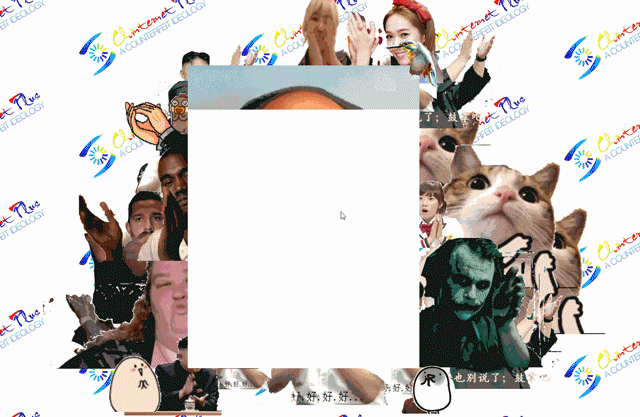
Screen recording of Miao Ying’s Chinternetplus.com
We’ll probably never get sick of artwork about the weird state of the internet in China. China is home to nearly a quarter of the world’s internet users, more than the United States, India, and Japan combined. But widespread Internet access is a relatively recent development there, and the government keeps an iron grip on content. Censors have placed China’s more than half-a-billion netizens behind “The Great Firewall,” severely limiting access to the rest of the world’s web. The upside: this has lead to the development of unique online subcultures and codes to work around authorities. And a wave of young artists has drawn inspiration from this political situation and the creative subversions it has fostered. For example, Miao Ying’s GIFs of blocked websites superimposed over landscapes and Chinese net aesthetics draw attention to the government’s censoring of social media and common reference sites. (We included Miao Ying’s blocked websites in the AFC-curated exhibition Geographically Indeterminate Fantasies: The Animated GIF as Place at Providence College.) And before she was an AFC contributor, Joyce Yu-Jean Lee collaborated on a pop-up cybercafe, FIREWALL, in Manhattan’s Chinatown. FIREWALL enabled users here to experience what the internet looks like from the perspective of an internet user in mainland China, where search terms such as “Tibet” and “Tiananmen Square” yield censored results. In a somewhat ironic twist, the act of displaying the internet as curated by the Chinese government drew ire from authorities.
Despite Beijing’s wariness of an open internet, it sees the web as a vital engine for economic growth, launching a much-hyped “Internet Plus” initiative to apply information technology to a range of industries. Internet Plus is a vague, grandiose plan—an example of authoritative pomp that’s ripe for parody. And Miao Ying’s “Chinternet Plus,” featured in the New Museum and Rhizome’s First Look: New Art Online program, rises to the occasion.

Screen recording of Miao Ying’s chinternetplus.com
The webpage is a scrolling information overload that remixes corporate presentation stock photos, government propaganda aesthetics, Chinese online vernacular, and plenty of interweb weird—think YouTube videos with Italo Disco soundtracks alongside GettyImages “Asiaselects” photos obscured by animated GIFs. Miao’s “Chinternet Plus” logo frames a loading icon with calligraphic brushstrokes and they byline “A Counterfeit Ideology.” If a PowerPoint presentation had been infected with Web 2.0 detritus, it would look something like this. It’s all the nostalgic fun of .net art with clever political subversion.
Under the heading “How do we reach it?” Miao explains:
Technology does not fix everything, but high end technology does. Reality should not hold back your need to project an image. Practical aesthetics alters reality to suit your vision, this practical aesthetic is powered by MeituPic’s Smog Auto-correct, which has been freshly released for consumption. Let smog removal give you back your blue sky.
Reality is not efficient enough, but your smart APPs are.
The paragraph hyperlinks to one of the selfie-editing apps prevalent on many Asian smartphones. In these programs, blemishes can be airbrushed away, soft-focus can hide wrinkles, and faces can even be slimmed or given a virtual facelift. Below the text, a grid of “before and after” stock photos show China’s notorious air pollution “fixed” through the miracle of post-production. It’s a witty response to the Potemkin environmental solutions leaders have raised and largely failed to execute.
In one composition, a wreath of individual “reply GIFs” of figures clapping enthusiastically surrounds a slow-moving GIF of Chairman Mao that looks like a large image failing to load over a slow connection. If the promises of a revolution remain unfulfilled, perhaps the high-speed infrastructure being lauded now won’t be all it’s cracked up to be. But “Chinternet Plus” also feels optimistic: if the insular online world behind “The Great Firewall” strives to be a closed ecosystem, nature finds a way. There will always be hacktivistis, artists, and weirdos remixing and subverting top-down culture.


Comments on this entry are closed.